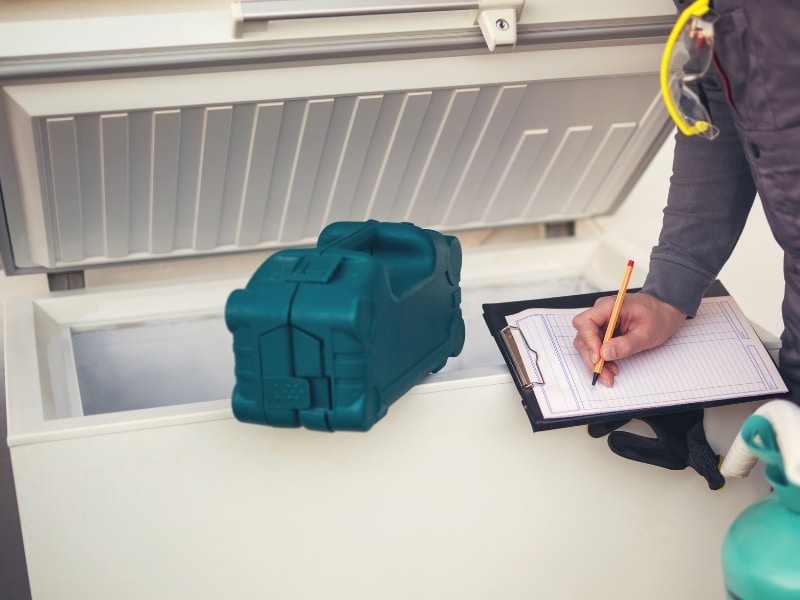Keeping a restaurant freezer in top nick isn’t just smart — it’s essential. With strict food safety regulations and tight margins, even minor issues can snowball into significant costs. Knowing when to schedule restaurant freezer repair helps you stay ahead of sudden breakdowns and avoid disruptions during service. The challenge? Many signs of freezer trouble are subtle. They creep up slowly, and by the time you notice, the damage might already be done. Whether it’s frost build-up, inconsistent temperatures, or noisy operation, recognising the warning signs early saves time and prevents spoilage. This article outlines when to act, what to watch for, and how experts keep your freezer reliable.
What signs show your restaurant freezer is underperforming?
Early detection goes a long way in avoiding severe damage. Here’s what to look for:
- Unstable temperatures: Products freeze inconsistently, indicating issues with the sensor or airflow.
- Ice build-up on components: Frost around fans or coils suggests poor defrost cycles or airflow blockage.
- High energy usage: A spike in power bills could mean the freezer is working overtime due to internal faults.
- Noise changes, such as rattling, buzzing, or grinding, may indicate worn fan motors or mechanical stress.
- Visible condensation: Water pooling near the base can signal seal failure or drainage issues.
You might also notice a decline in product quality, such as meats taking longer to freeze or soft serve melting too quickly. Spotting these signs early gives you the upper hand. Keep an ear out too, a freezer making a loud noise could mean parts are wearing down. Best not to wait until service stops mid-shift. Stay alert, consistent checks help you prevent more serious complications.
Why do many restaurants put off essential freezer maintenance?
It’s common to delay service until things go pear-shaped. But here’s why that approach backfires:
- Fear of operational disruption: Many managers avoid scheduling during trading hours, which can lead to bigger problems later.
- Misjudged urgency: Staff might assume minor frost or strange sounds are no big deal.
- Budgeting misconceptions: Some people think maintenance is too costly — until they face the prospect of complete equipment replacement.
- Understaffed kitchens: With limited time and a small crew, maintenance often gets pushed down the priority list.
- Lack of system tracking: Without logs or reminders, service dates slip through the cracks.
Avoiding a service call may seem like a cost-saving move, but it often sets the stage for more significant problems. A single missed inspection can result in spoiled goods, unusable inventory, and even full-day shutdowns. Prioritising reliable restaurant freezer repair for commercial kitchens helps you stay ahead of these disruptions.
What common repair mistakes can shorten your restaurant freezer’s lifespan?
Many kitchens attempt to save a dollar by fixing things DIY-style, but it often backfires. These mistakes are hazardous:
- Non-certified replacement parts: Cheap components may not fit properly or fail prematurely, potentially stressing the system further.
- Skipping post-repair calibration: Restoring factory settings is critical — otherwise, efficiency drops.
- Ignoring electrical diagnostics: Failing to check the wiring or control board can mean that hidden faults remain undetected.
- Rebooting too soon: Power cycling too quickly after service can damage compressors.
- Using generalist repairers: Commercial systems require specialised knowledge that most household techs lack.
What’s worse, these short-sighted repairs often don’t address root causes. You fix the symptom, not the problem. That leads to repeated breakdowns and extra service calls. Many of these mistakes relate to common issues that cause freezers to stop cooling properly, which can be prevented with skilled attention. Small mistakes during repair can have significant consequences for your kitchen’s functionality and profitability.
What preventive measures help reduce emergency breakdowns?
Prevention doesn’t have to be complex. A few focused actions can dramatically lower breakdown risks:
- Regular coil cleaning: Dust and grease build-up force the unit to overwork, risking overheating.
Weekly seal inspections: Damaged gaskets allow warm air in, disrupting interior temperatures. - Clear airflow paths: Avoid storing items in front of fans or vents to maintain circulation.
- Document service dates: Keeping records helps track part replacements and identify patterns.
- Train kitchen staff: Empowering the team to spot and report issues early adds an extra layer of protection.
A proactive freezer care strategy helps you plan downtime during off-peak hours, not in the middle of Friday lunch rush. Plus, it keeps your warranties intact.
| Feature | Preventive Maintenance | Reactive Maintenance |
| Service Frequency | Scheduled 1–2 times per year | Only when breakdowns occur |
| Average Annual Cost | $300–$600 (predictable budgeting) | $1,000–$2,500+ (unplanned expenses) |
| Operational Downtime Risk | Low – planned during off-peak hours | High – can happen during service hours |
| Impact on Equipment Lifespan | Extends unit life to 10–12 years | May reduce lifespan to 5–7 years |
| Risk of Stock Loss | Minimal – issues caught early | Frequent failures can cause spoilage |
When in doubt, follow the refrigeration maintenance practices to ensure Australian businesses stay compliant and efficient. Planning ahead beats scrambling for fixes every single time.
Is seasonal servicing essential for freezer efficiency?
Absolutely, weather shifts place different demands on your system throughout the year. Here’s what that looks like:
- Summer stress: High ambient temperatures make compressors work harder, exposing weak components.
- Autumn cleanup: Leaves, dust, and debris can block external units and filters if left unchecked.
- Winter strain: Cold air outside can mask inefficient performance, causing delays in action.
- Spring preparation: Transitional temps expose inconsistencies in defrost or sensor function.
Seasonal servicing aligns freezer performance with climate needs. It’s also a perfect time to review your logs and check for recurring issues. Missing seasonal checks can allow hidden problems to fester, only to emerge during high-traffic service periods. That’s bad news during school holidays or catering events. Without seasonal checks, your freezer could be 20–30% less efficient and far more prone to failure. A little planning each season keeps your kitchen cold and costs under control.
How do experts handle restaurant freezer repair effectively?
Professional technicians don’t just repair — they restore reliability. Their approach is precise and proactive:
- Diagnostic precision: Advanced tools identify issues fast — no guesswork involved.
- OEM part usage: Using only original parts protects your warranty and ensures a perfect fit.
- System-wide review: From sensors to wiring, everything’s tested to prevent recurring faults.
- Operational testing: Full run checks post-repair confirm proper temperature cycling and airflow.
- Report transparency: Good techs explain what failed, what was done, and what’s next.
Experienced techs also spot issues that aren’t urgent now but could become significant risks. That helps you budget ahead, rather than reacting under pressure. Whether you’re dealing with temperature swings, fan motor faults, or repeated icing, the right help keeps your gear humming.
Final thoughts
Every kitchen runs differently, but the cost of ignoring minor freezer issues adds up in wasted stock, late-night callouts, and missed service windows. Regular maintenance isn’t just smart — it’s non-negotiable. To reduce stress and protect your margins, timing your restaurant freezer repair right makes a world of difference. If you’re unsure where to start, review your last service date, look for warning signs, and pencil in a seasonal check. For those looking to plan ahead, take a moment to explore how Ice Man Sydney can support your operation with tailored service options and expert guidance.



